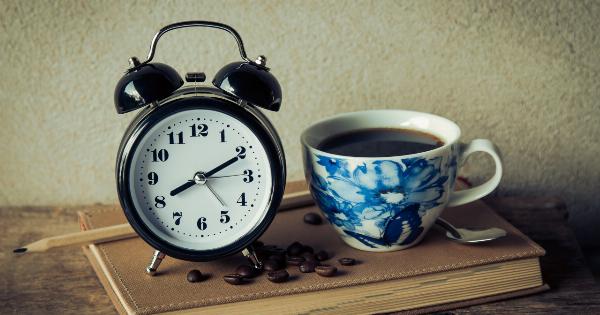Coffee is one of the most consumed beverages in the world. People enjoy its energizing effects and drink it to stay alert and awake.
But did you know that drinking coffee can affect your body’s biological clock? In this article, we will explore the relationship between coffee and the body’s circadian rhythm.
What is the Biological Clock?
The biological clock, also known as the circadian rhythm, is a natural 24-hour cycle that regulates the sleep-wake cycle, metabolism, and other physiological processes in the body.
This internal clock is controlled by a group of nerve cells in the brain known as the suprachiasmatic nucleus (SCN). The SCN receives information from the eyes about the amount of light present and uses this information to synchronize the body’s circadian rhythms with the environment.
Coffee and the Body’s Biological Clock
Coffee contains caffeine, a stimulant that affects the central nervous system.
When you drink coffee, caffeine gets absorbed into the bloodstream and reaches the brain where it blocks the action of adenosine, a neurotransmitter that promotes sleep and drowsiness. As a result, caffeine makes you feel more alert and awake.
But caffeine doesn’t only affect your brain. It also affects your body’s biological clock. Studies have shown that caffeine can delay the timing of your body’s circadian clock by up to 40 minutes per day.
This means that if you drink coffee in the late afternoon or evening, it can disrupt your sleep-wake cycle and make it harder for you to fall asleep at night.
Caffeine and Melatonin
Melatonin is a hormone that is produced by the pineal gland in the brain. It is responsible for regulating the body’s sleep-wake cycle and is released in response to darkness.
Melatonin levels in the body start to rise in the evening and peak at night, making us feel drowsy and ready for sleep.
Caffeine can interfere with the production of melatonin and disrupt the body’s natural sleep-wake cycle. Studies have shown that even small doses of caffeine can decrease melatonin levels in the body and make it harder to fall asleep at night.
This is why it’s important to avoid drinking coffee or any other caffeinated beverages in the late afternoon or evening.
Caffeine and Sleep Quality
Caffeine not only affects the timing of the body’s biological clock, but it can also affect the quality of sleep.
Studies have shown that consuming caffeine before bedtime can reduce the amount of deep sleep and REM (rapid eye movement) sleep that a person gets during the night. These stages of sleep are critical for restoring the body and brain and are essential for good health.
Additionally, caffeine can cause sleep disturbances such as insomnia, waking up frequently during the night, and disturbed sleep patterns. It’s important to note that the effects of caffeine on sleep quality can vary from person to person.
Some people may be more sensitive to caffeine than others and may need to avoid it altogether.
Conclusion
Coffee is a popular beverage that many people enjoy for its energizing effects. However, it’s important to be aware of the potential effects that coffee can have on the body’s biological clock.
Drinking coffee in the late afternoon or evening can disrupt the body’s circadian rhythm and make it harder to fall asleep at night. Additionally, caffeine can interfere with the production of melatonin and reduce the amount of deep sleep and REM sleep that a person gets. For optimal health, it’s best to limit caffeine intake and avoid consuming it before bedtime.





























